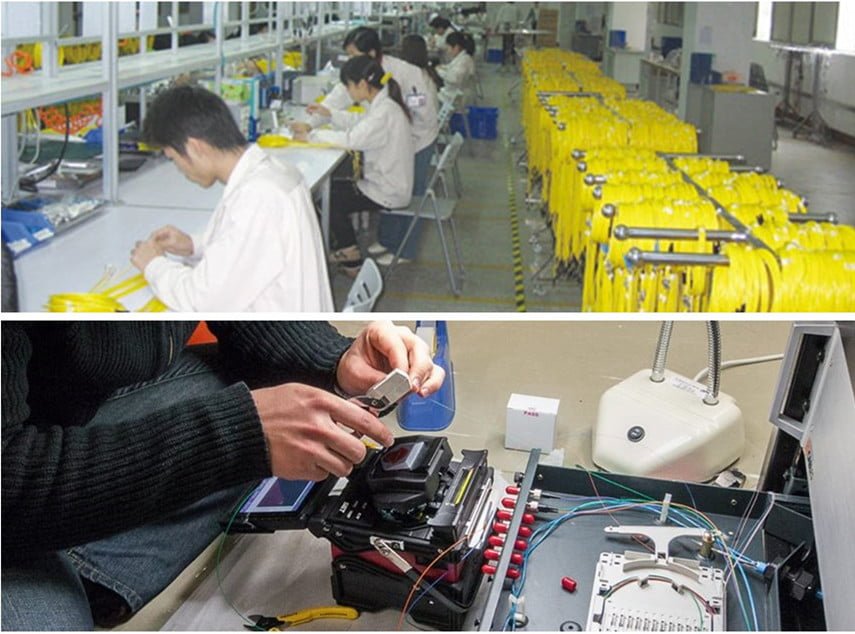Fiber optic cable Factory Termination and Field Termination
Fiber optic cable termination can be mainly split into two types that are factory termination and field termination. For tighter loss budget, the best approach is factory terminated cables since it is much easier to achieve low loss and quality connector terminations in a controlled factory environment. On the other hand, field terminations provide far more flexibility in meeting system requirements. As technicians face important trade-offs in deciding which method of choose, here provides a detailed comparison on merits and choices between factory termination and field termination.

Merits of Factory Termination and Field Termination
Advantages:
- Factory Termination: The factory has to guarantee the quality. Fiber optic manufacturers have highly trained technicians and quality equipment for the job. Factory technicians usually are expert on fiber connector polishing plus they produce thousands of optical patch cords and fiber pigtails on a daily basis. Factory termination offers the cheapest. Since factories produce mass volume of fiber patch cords, they’ve reduced the price towards the most favorable point. This is actually the most economic choice.
- Field Termination: Field termination offers the best flexibility in meeting system requirements. You can just pull the fiber cables and terminate them later. That you can do on-the-spot repairs wherever there’s a defective fiber link. This is actually the biggest advantage of doing the termination yourself.
Disadvantages:
- Factory Termination: Factory termination doesn’t provide as much flexibility as field termination. You need to get the exact listing of fiber lengths and quantities and you’ve got to make certain that you’ve enough spare period of cable for every termination.
- Field Termination: Field termination is high cost. You need some polishing tools and supplies. Field termination quality are suitable for multimode applications, however for single mode applications, you’d better leave that to factory termination. The field termination technician must be highly skilled. He would have to practice a great deal offline before doing the actual work. A poor termination can cost you both time and money.
Choices of Factory Termination and Field Termination
Choosing Factory Termination:
- Factory pre-terminated cables: For this kind of business, you give a list of cable types, lengths and quantities to the factory. The factory will deliver each pre-terminated cable on the reel. You just need to pull these cables through duct carefully having a cable netting to safeguard the connectors.
- Factory pre-terminated pigtails and splicing: This can be a intermediate approach. You order cable segments with factory-mounted connectors on one end only. You have to order some fiber pigtails and then splice the pigtail towards the un-terminated end from the cable. This is a fast and simple approach. However, it takes that you currently have the fusion splicers. Or else you would need to choose the less reliable mechanical splicing.
Choosing Field Termination:
- Field installation of epoxy and polish connectors: Plenty of experience technicians still prefer this way because it provides the best flexibility and the lowest possible cost. Epoxy and polish connectors overlap with used by factories. You pull the fiber first, after which terminate the fiber on the site. This involves fiber optic epoxy, high temperature curing oven, scribe tools, polishing films and fiber optic inspection microscopes. This method needs you to have a fiber termination kit which includes these items.
- Field installation of quick termination connectors: Quick termination connectors really are a god bless for emergency repairs. This kind of connector functions as an optical pigtail. It is pre-polished within the factory. It features a fiber stub within the connector body. You just need to cleave your fiber, insert it into the connector body, and lock it per the connector manufacturer’s instruction. However, it doesn’t provide just as much long-term reliability as the epoxy and polish connectors. Also, quick termination connectors are much more costly then standard epoxy and polish connectors.
